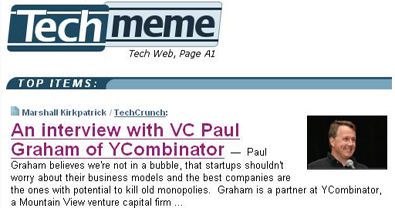Graham on Web 2.0 investing: VCs are no angels

Paul Graham, YCombinator, has spoken; in a TechCrunch Q & A.
Of particular note is Graham’s immediate reaction to the posting of the interview; In a comment at the post, Graham noted what he considers an “inaccuracy” with the TechCrunch headline:
Though the intro calls me a VC, that’s not really accurate. In the business, “VC” has a very specific meaning. VCs run funds, like mutual funds; they invest on behalf of the investors in their funds. At Y Combinator we invest our own money, which makes us closer to angel investors.
VCs and angels have very different personalities.VCs are mostly MBAs, while angels are generally tech people.
TechCrunch immediately republished the story with a heading which is apparently more to the subject’s liking. Below are screen shots of 1) the TechCrunch post in Techmeme reflecting the post's original headline and 2) the TechCrunch post at TechCrunch now with the post Graham comment revised headline.

Editorial integrity aside, Graham’s seeming disdain for MBA VCs is consistent with his disdain for the MBA driven, business model based rigorous financial projections which ordinarily support venture capital investment decisions:
What I tell founders is not to sweat the business model too much at first. The most important task at first is to build something people want. If you don’t do that, it won’t matter how clever your business model is.
Of course you have to have a business model eventually…I get a lot of criticism for telling founders to focus first on making something great, instead of worrying about how to make money.
Graham may not be advising founders on “how to make money” because he does not give founders much money to begin with; his “angel” investments represent scant more than a three month “allowance.” According to YCombinator:
We usually invest $6000n in each company, where n is the number of participating founders… $6000 per person is not a lot, but it turns out to be enough. It will cover at least 3 months' living expenses, and 3 months is enough time to build something nontrivial.
In “Graham on Google: Web 2.0 foe” I reflect on Graham's cynicism regarding the disposable nature of the Web 2.0 start-ups he chooses to invest in and cite Graham on his Kiko investment failure:
There's another encouraging point here for the new generation of web startups. Failure is not a disaster when you're very light. The total amount raised by Kiko in its existence would be about six months' salary for a first-rate developer. There's a good chance they'll recover most of it by selling their code. They only had one employee besides themselves. So this is not an expensive, acrimonious flameout like used to happen during the Bubble.
They tried hard; they made something good; they just happened to get hit by a stray bullet. Ok, so try again. Y Combinator funded their new idea yesterday.
What is Graham’s investment rationale for the Kiko team’s second time at bat?:
it is certainly the most entertaining idea we’ve ever funded. In fact, insane might be a better word. But it’s what they wanted to do.
MORE ON KIKO FAILURE & WEB 2.0 VC INVESTING
Eight sure ways to get in TechCrunch Deadpool
Web 2.0 dreaming: get rich quick, or fail trying
eBay: Web 2.0 failed start-up flea market?